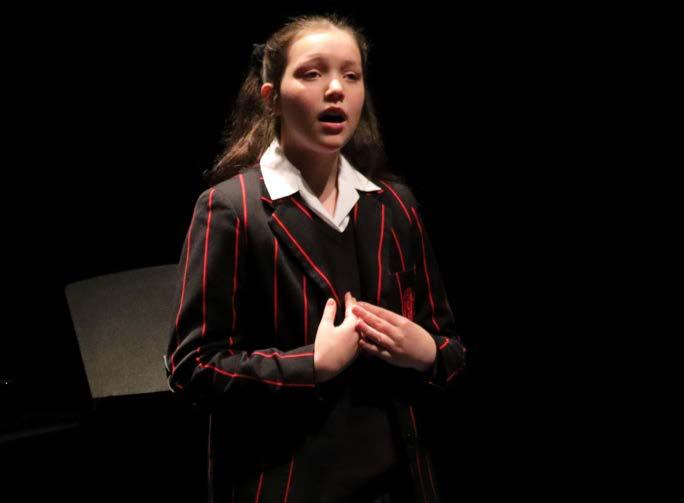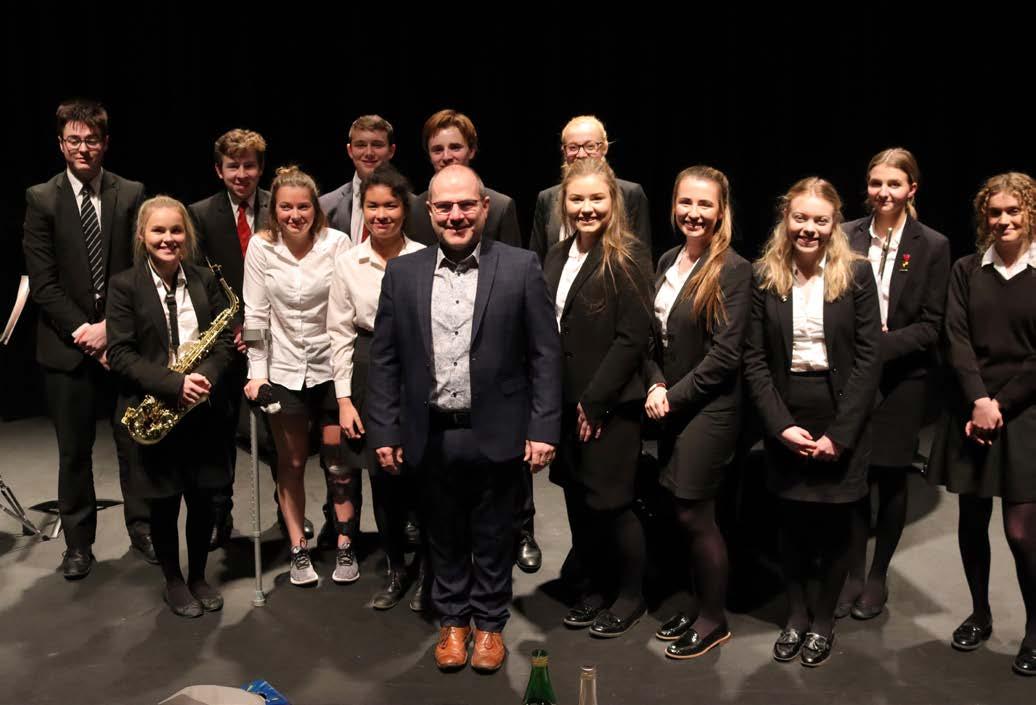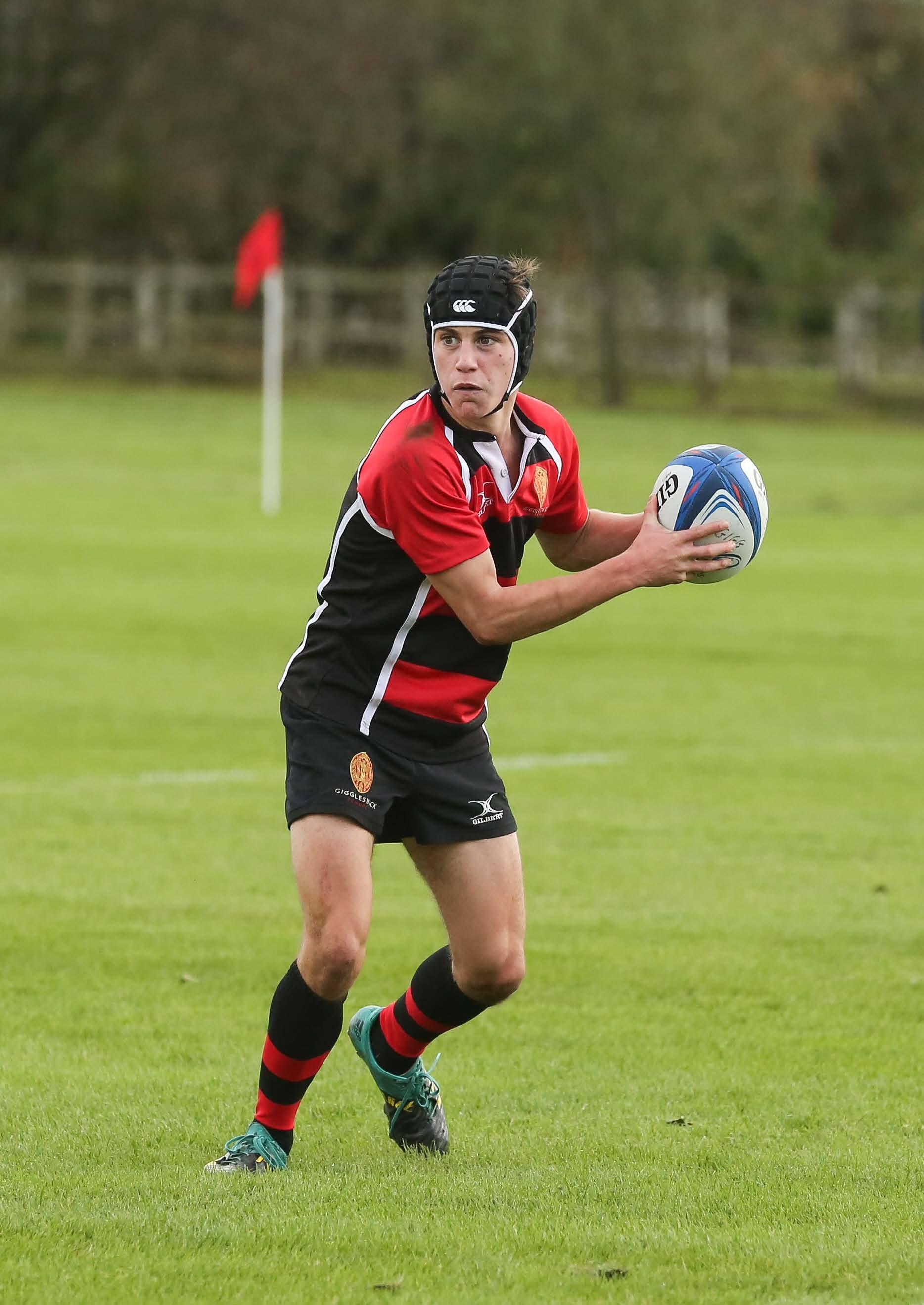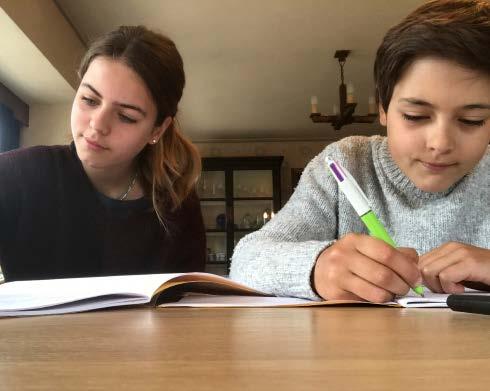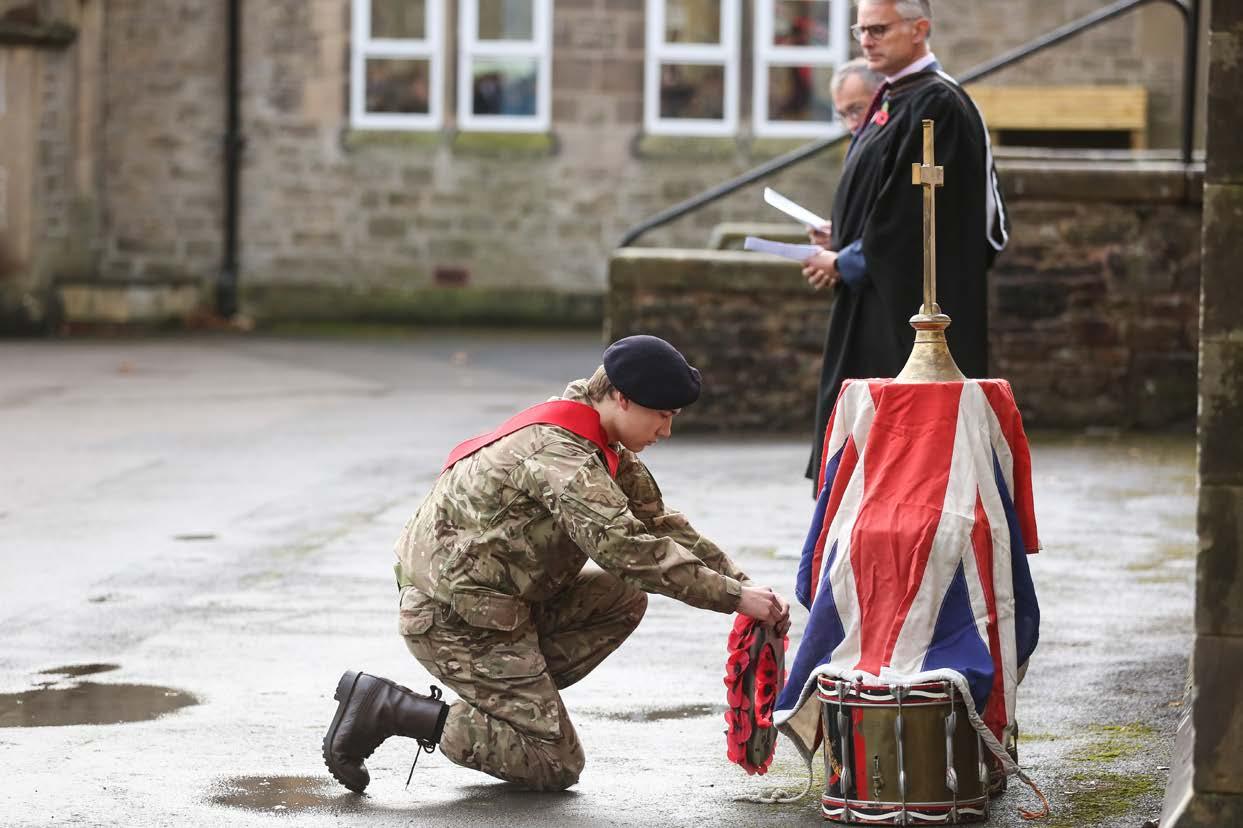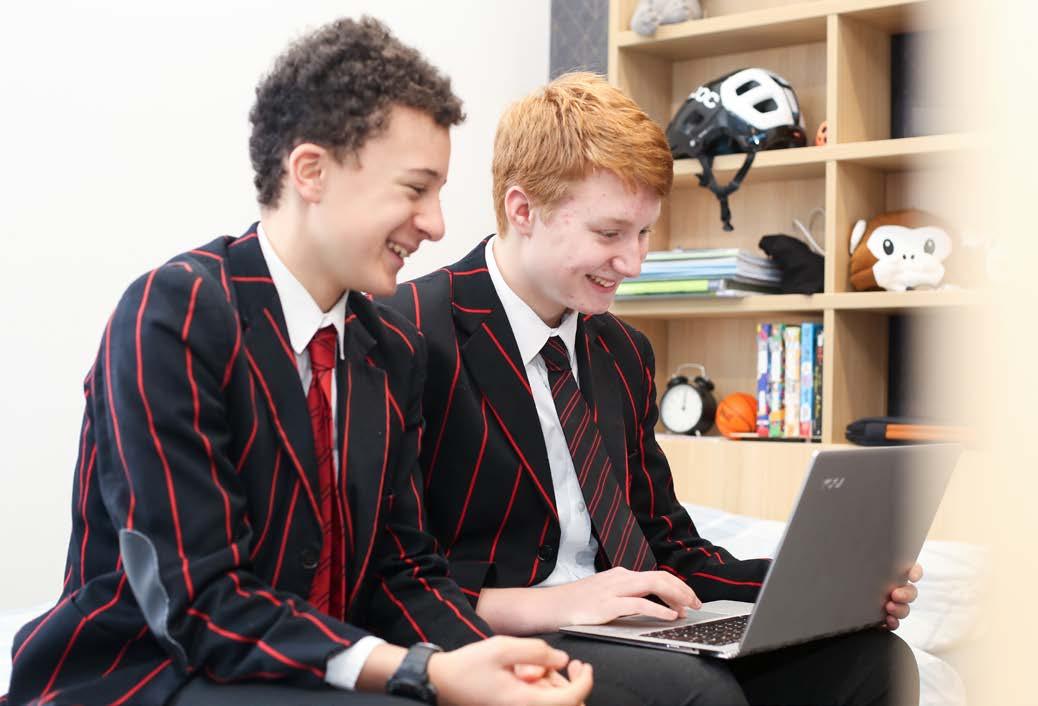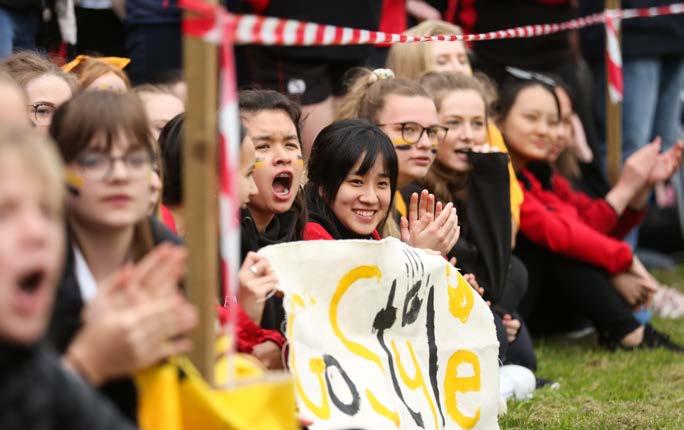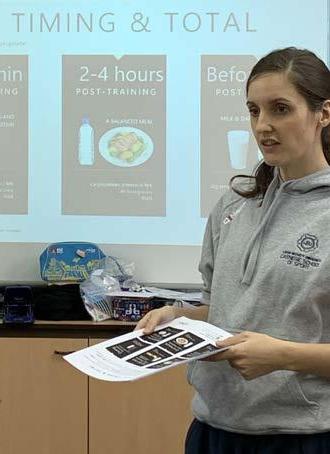
19 minute read
Performing Arts
Review Performing Arts
Advertisement
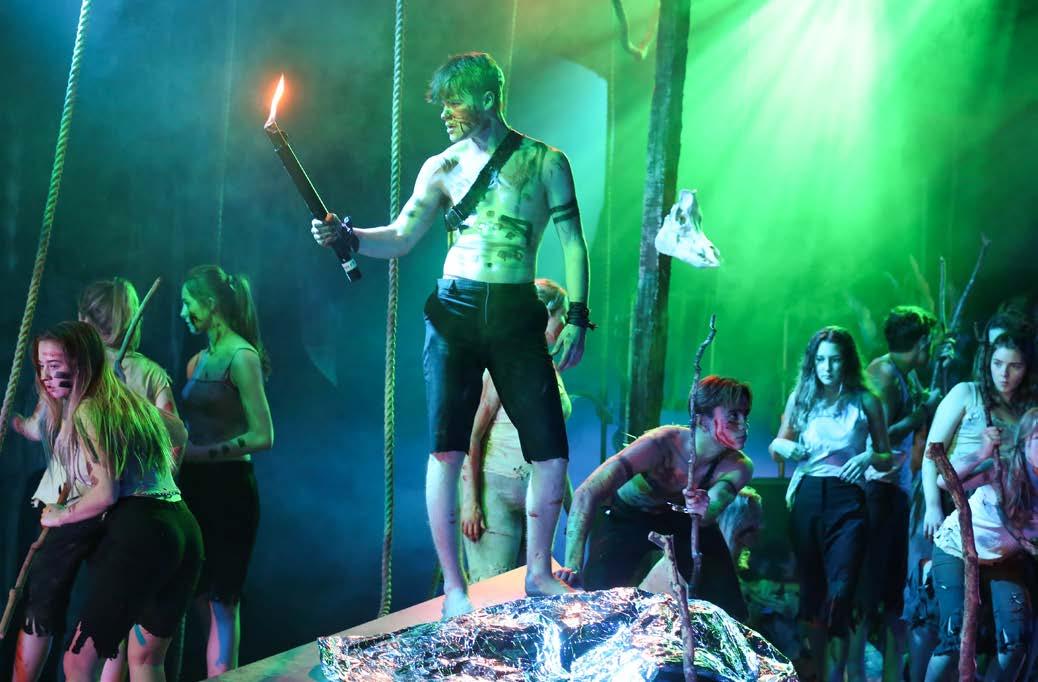
Local theatre critic Gill O’Donnell gives the highest praise to the cast and production team of ‘Lord of the Flies’, performed over four nights in the Richard Whiteley Theatre.
Adapted for the stage by the award-winning novelist and playwright, Nigel Williams, this interpretation of William Golding's controversial novel Lord of the Flies is emotionally intense and its themes are still powerfully relevant in today's political climate. The storyline deals with a group of pupils, evacuated from a conflict zone, who become stranded on an island and their attempts to survive and the subsequent peeling away of the veneer of civilisation. The story is in many ways the stuff of nightmares: fear of being abandoned; loss of control; erosion of order and the horror of something malevolent out there in the dark. These dark themes are brought to frightening life in a production which moves with the speed of a forest fire, drawing the audience in ever deeper by a combination of stunning acting and clever stagecraft, with an impressive use of lighting and sound. The set too becomes an important metaphor as it changes from being an island where all are free to wander to become two distinct territories: one, the sandy beach which is gradually being eroded and littered with waste, and the other, a place of shadows and violence. It is hard to find sufficient words to praise the calibre of the cast, many only in the first years of their secondary education, as they achieved a production which was outstanding in every area. Their commitment to the production shone through and the show was clearly the result of a tremendous amount of hard work and dedication. The ensemble nature of the show meant that everyone was on stage for most of the time and this required sustained concentration and involvement throughout: not an easy task but one which all fulfilled. One clear example of this was Martha Richmond as Perceval, who embodied the confusion of the younger children and is clearly a talent to watch out for in future productions. The protagonists in this performance were exceptional, engaging the audience from the first. Isabelle Thompson, as Simon - a particularly complex character, was compelling and in conversation with the beast was heart-rending. Similarly, Sophie Huber as Piggy, the voice of reason, was totally compelling. Likewise, Olivia Henson as Ralph and Jack Harrison as Jack were excellent and the tension between them crackled from the outset to the very last moment. This was acting of the very highest standard. The decision to work with two different sets of actors taking the key roles means that at each production there will be a different dynamic which again will add another level of interest to the performances; however, I have no doubt that in all instances they will maintain the high standard set on this opening night. Congratulations, therefore, to everyone involved both on and behind stage, particularly those involved in the technical side of the production as their contribution added so much to the overall shape and effect of the finished show, and to the directorial team whose ideas shaped this amazing piece of theatre.
Gill O’Donnell
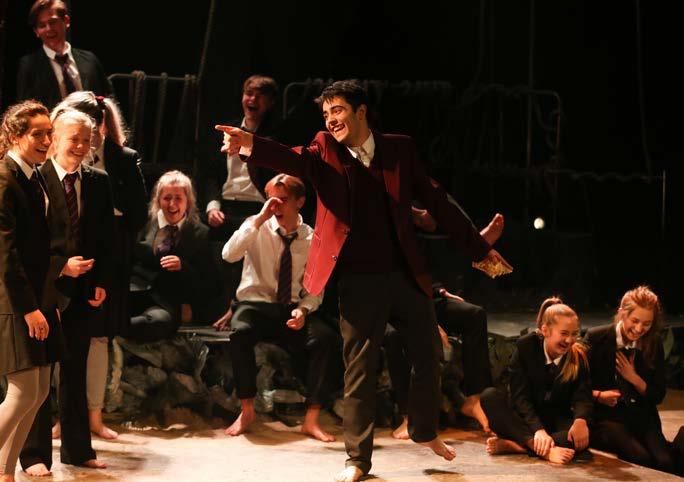
MIDSUMMER NIGHT’S MAGIC PROVES TO BE ‘THE MOST DEMANDING PIECE OF THEATRE THEY’VE EVER BEEN PART OF’.
The middle school took on one of Shakespeare’s most enduring and enigmatic plays. Every year, our budding young performers in Year 9, Year 10 and Year 11 are given the opportunity to take centre stage in a Shakespeare play. Here, Luke Prowse Baldwin our Theatre Practitioner reflects on this year’s impressive production.
The post-show blues are yet to go away! As a production team, we are incredibly proud of what we created, especially the performances of our superb cast. Shakespearean texts are undoubtedly some of the very hardest to deliver, and the challenge was only heightened by the immersive set-up. Despite this, we were once again blown away by both the confidence and understanding of each production element that these young people showcased, more and more so throughout the process. It’s important to remember that the youngest members of the cast were just 13 years of age, and for many, this production was the most demanding piece of theatre they’ve ever been a part of. Taking this into account, the ease with which they adapted to the needs of the show must be highly commended. Huge credit must also be given to the company’s more experienced students, who led by example throughout rehearsals and the run of shows themselves. Cast members constantly pushed boundaries, and whilst a number of these ideas needed refining, their proactive, ambitious mentality paved the way for the gutsy moments of others. Our Upper Sixth assistant directors were very useful in passing on their expertise to the cast as well. Making this show with such talented individuals was wonderful, and sharing it was even better, but it’s not all down to the children. As fantastic as the cast and musicians were, those young people wouldn’t have had an experience as magical without such brilliant audiences! Thank you to all those involved, and thank you to everyone who came to see it."
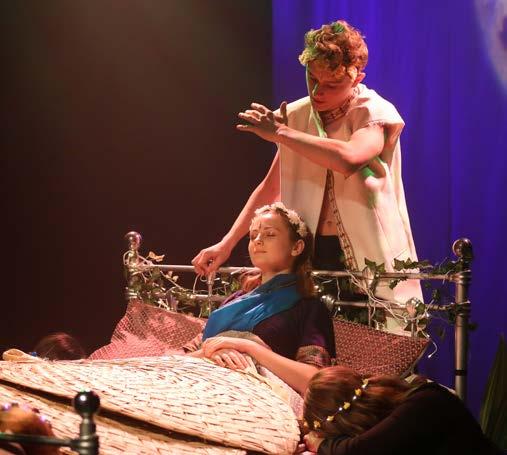

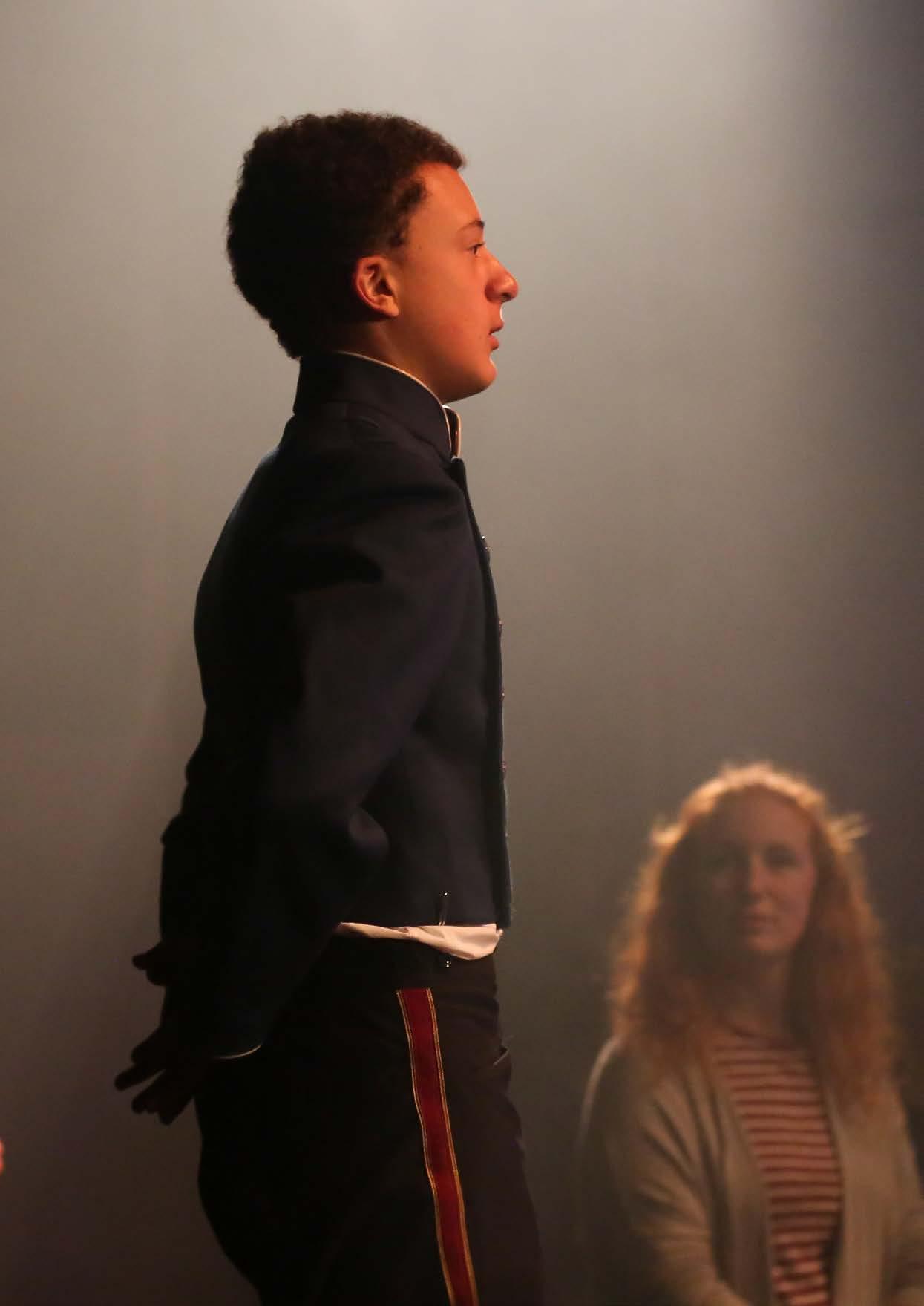
MUSIC REVIEW 2020
The school falls silent but the music plays on.
The academic year 2019-2020 has seen the usual wide array of co-curricular music, with the following diverse range of ensembles on offer for our school singers and instrumentalists to take part in on a regular basis: Chapel Choir, Schola Cantorum (our elite Chamber Choir), Orchestra, Concert Band, Folk Group, Flute Trio and the Sax and Clarinet group, not to mention all the individual rock groups who rehearsed all through the Autumn Term and into the Spring Term in preparation for our ever-popular Rock Concert on 1st February. This was a roaring success and involved 24 items. There would have been more, but the evening would have gone on too long. It is one aspect of Giggleswick which is so rewarding, however; that the students are so keen to participate that we end up having too much material! Shortly after this event we held the annual, much-anticipated Giggleswick Young Musician of the Year competition, held on 8th March. This year’s adjudicator was Tim Harvey, a past, highly respected Director of Music at the school. Seventy-five students took part in the various classes on the day, from Piano, Strings, Woodwind and Brass through to Guitar, Drums and Singing, of an ever-increasing standard as the day went on. Tim Harvey commented on how well all the students conducted themselves on stage while performing. They never forgot to thank their accompanist, even in the early, often younger-aged classes, and he said this ability to be poised and confident, while obviously nervous, and remembering to be courteous, was a very rare skill these days. As usual, the Final Class of students Grade 8 and above, had an amazingly high number of entrants, given Giggleswick is not a specialist music school. There were 13 students battling for the much coveted cup. Overall, we congratulate Martha Lloyd who won the Key Stage 3 prize with her lovely singing, while still only a Year 7. A remarkable achievement! And we congratulate Maddison Goode who became the Giggleswick Young Musician of the Year 2020, her third win in a row. What outstanding musicianship! Sadly, our long-rehearsed for and looked-forward to annual Spring Concert could not take place because of the school having to close the campus for the last week of the Spring Term. We had had 60 students lined up to perform in 10 concert items, ranging from the Orchestra performing the difficult First Movement of Mozart’s Symphony No. 40 in G minor, to the Concert Band performing Joe Garland’s and Glenn Miller’s In the Mood. Both choirs were also to have performed, singing highlights from their two terms of singing regularly in Chapel and further afield. Schola was due to sing Choral Evensong at Bolton Abbey in April and were very disappointed to have
to cancel this event. The Chapel Choir’s proposed trip to Vienna during the summer holidays of 2020 did not get off the ground this year. This was a blessing in disguise, as it would have had to be cancelled. Perhaps this is something that can go ahead in the future. The school continued to enter a large number of students for individual instrumental and singing exams, through the ABRSM and Trinity. This year, out of all the ABRSM entries, 10 were Grade 6 and above, one even being a post- Grade 8 Diploma. This was Emma Belshaw, who gained a Distinction in her ARSM Piano Performance diploma, a wonderful achievement for someone not yet in Sixth Form. Grace Forsyth should be congratulated also on gaining a Merit in Grade 8 Singing. In all, there were 10 high passes (five Merits and five Distinctions) as well as all the standard passes, which is a great success story for a small school like Giggleswick. Thank you to our dedicated team of Visiting Music Teachers, ably managed by Laura Stott, who have helped us achieve these great results. It only leaves me to thank all the Music Department staff: Laura Stott (Head of Instrumental Music); Gareth Maybury (Music Technology, KS3 Music and Drum teacher); Phillip Broadhouse (School Organist and KS3 Music teacher); and Katie Baskeyfield (Drama and KS3 Music teacher). It has been a privilege to work with such a great team over the last four years and I shall hold very fond memories of Giggleswick School for the rest of my life.
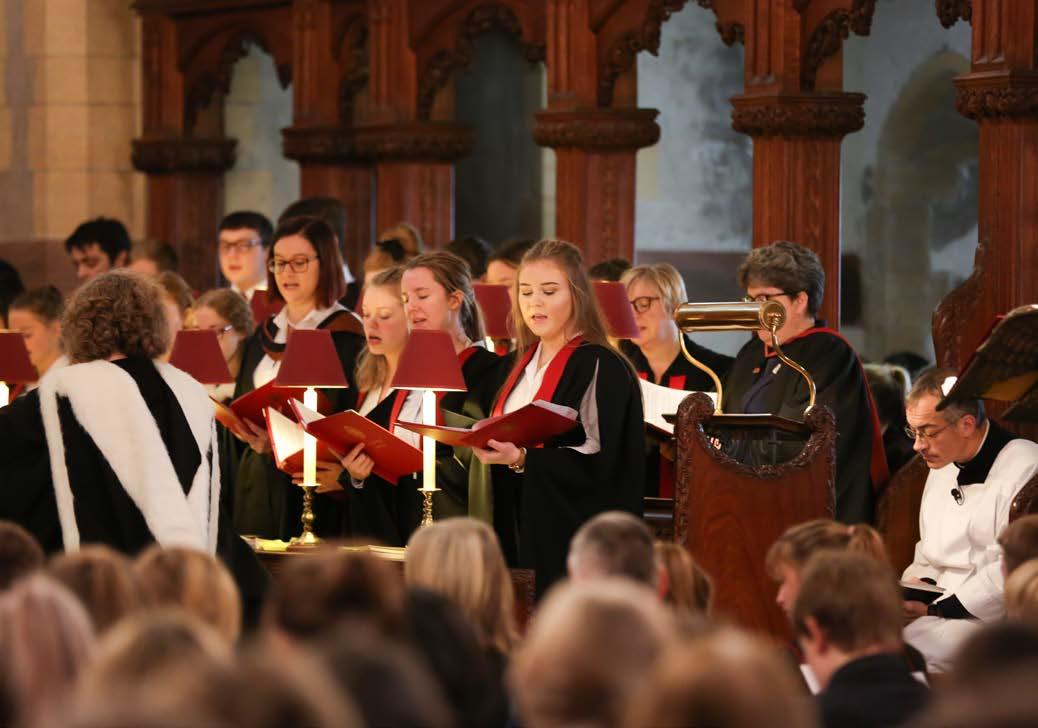
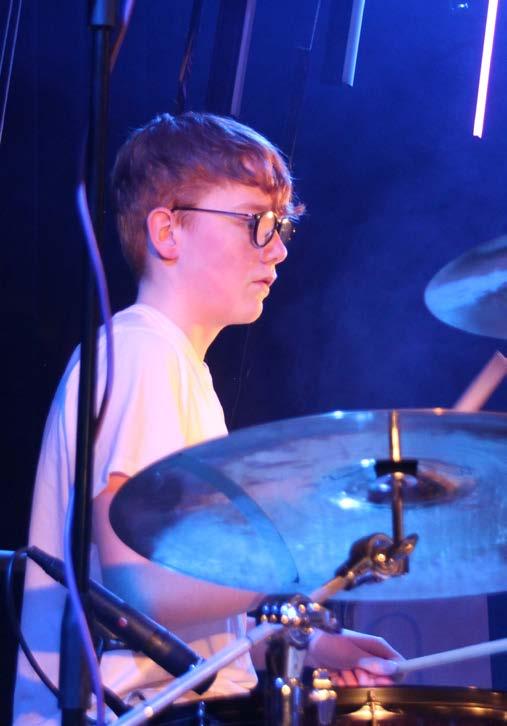
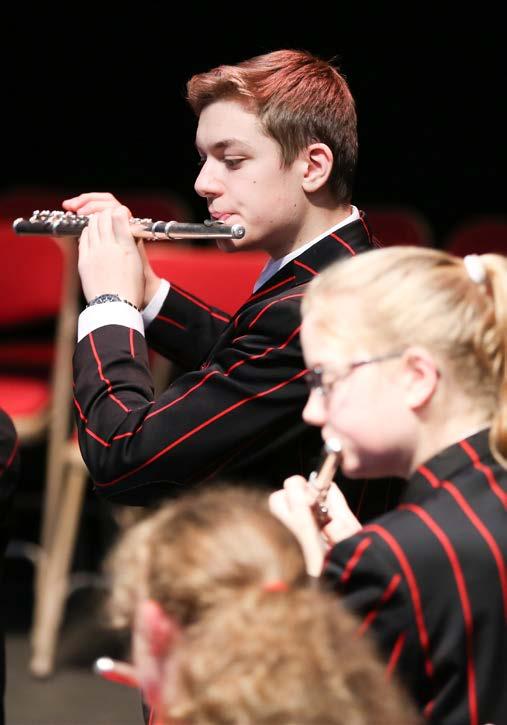
PERFORMING ARTS REVIEW 2020
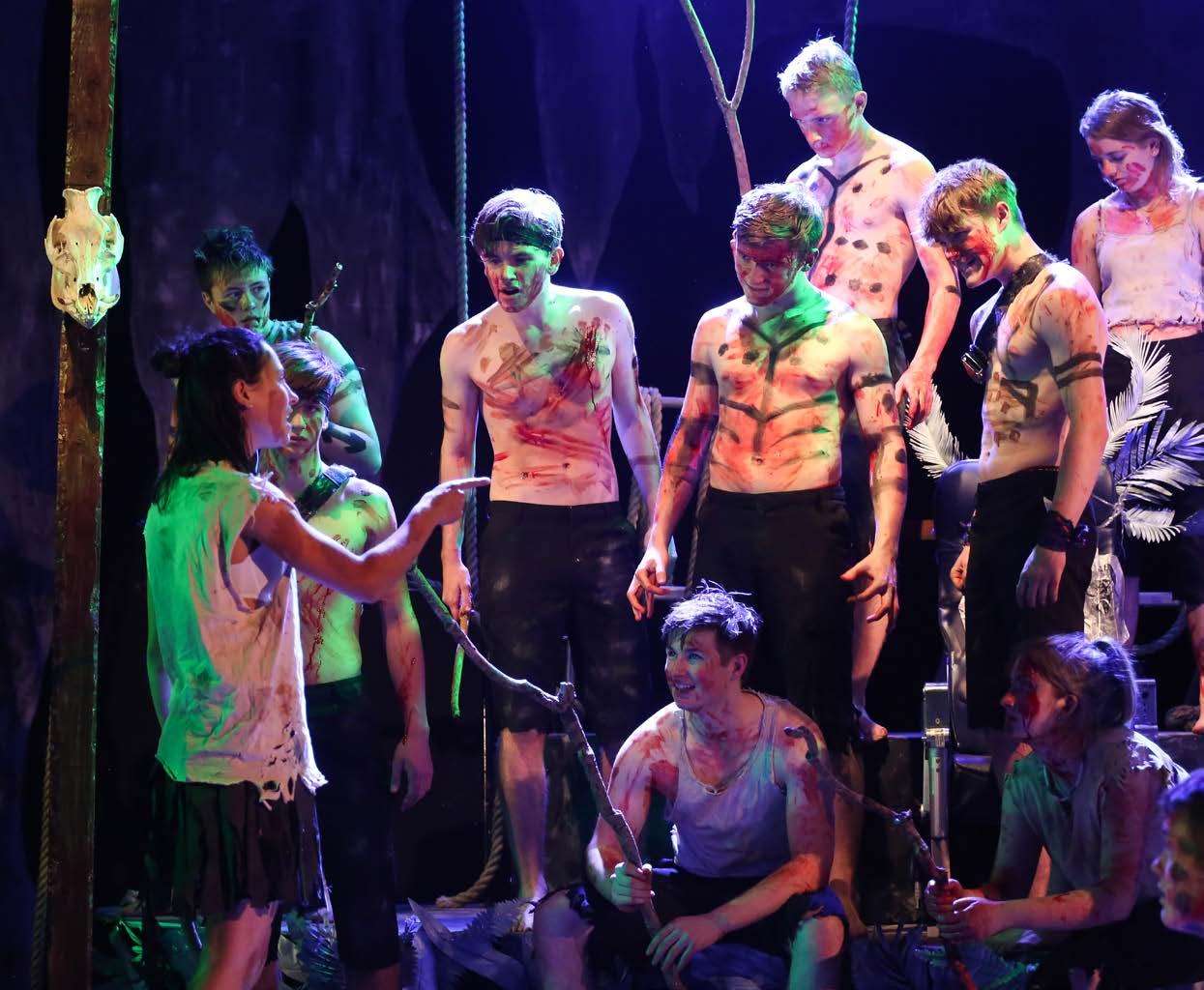
Looking back over the last academic year, it is difficult to imagine that we could have crammed in as much as we have, particularly in light of the pandemic lockdown.
The superb work brought to the stage is a testimony to the hard work, commitment and passion sustained by pupils and staff. Our vision is to generate a centre of excellence for the Performing Arts at Giggleswick School; to some extent we have continued to navigate this perilous and ambitious journey. Some of the very best theatre we have seen this year, on both an amateur and professional level, has taken place at Giggleswick School. In total seven productions were undertaken, and we played host to three touring companies. Here are some of the highlights. Our immersive production of A Midsummer Night’s Dream was a resounding success, receiving a rapturous applause from all audience members across three performances. The Richard Whiteley Theatre became an enchanted forest as cast members moved in between mesmerised audiences, encouraging them to engage in the world of the play. Unwitting audience members were plucked from the audience, becoming participants in the show. Swings descended from the ceiling to elevate the magical status of Puck, Oberon, and the fairy realm. In a seamless and wildly inventive production, three worlds merged in a way which created an hilarious evening for all present. The courtly lovers were reduced to literally becoming entangled in a magical web of their own emotions;
the fairy kingdom was wildly acrobatic, inverting all nature, suspended from swings; and the clowning of the rustics reduced everyone to helpless laughter. Throughout, a talented band of musicians underscored the show with contemporary songs and music. For some, this new theatrical experience was initially a little daunting, but by the end of the performance all were mesmerised and willing to take part in a crowd dance and song. My abiding memory will be of primary school pupils from across the region who were invited to the RWT. Initially some were unsure and a little intimidated by the spectacle, but by the end of the show they were in awe of the work placed before them. To witness the shift from confusion to absorption and their reluctance to leave after the show is testimony to the accessibility of Shakespeare’s work, as well as the superb skills of a very young cast. There seems little point in commenting upon the success of Lord of the Flies as Gill O Donnell’s review captures the excitement and emotional catharsis it generated. This was a powerhouse performance which captured the political wrangles of the day, reflecting the darker side of the human condition. The cast and crew were extremely young, but rose beautifully to the challenge. This is a show I have seen many times on the professional stage, but the rawness, honesty, and intelligence the cast brought to the work surpassed my expectations. The result was a performance which outstripped any version of the play I have seen to date - truly remarkable. A very moving and thought-provoking production of My Mother Said… by the Upper Sixth won great critical acclaim. The audience witnessed a theatrical experience which challenged their preconceptions of women’s role in history and society as well as theatre’s function and purpose. Many were moved to tears by the emotive pleas of the central characters searching for love, dignity, and self-esteem. The visiting examiner said he would have “happily paid money to see such quality work: professional theatre above and beyond the course specification”. Similarly, the immersive production of Martin McDonagh’s The Pillowman left the audience reeling as they entered the dark world of an interrogation room enclosed in the same cramped environment. It was easy for the audience to assimilate the same position of bewilderment and fear as that of the central protagonist. A dark, brooding piece of theatre reflecting upon the nature of censorship and the impact literature can have upon society. Our GCSE Drama students also had a very fruitful year and we have seen many examples of superbly devised work. Through the medium of theatre, the pupils have examined a range of issues in a very intelligent, mature, and sensitive way. The sheer volume of work produced is such that we cannot detail everything. However, here are some of our favourite moments. Sophie Huber, Maud Humphries, Martha Richmond, Sophie Smith, and Saskia Steca beautifully crafted a piece dealing with mental health and fears. The visually striking work produced discussion and reflection, and was well received by an audience of peers. Olivia Henson, Alison Fry, James Cobley and Alistair Meiring presented a thought-provoking piece which served to raise the school’s awareness of the pressures generated by social media.
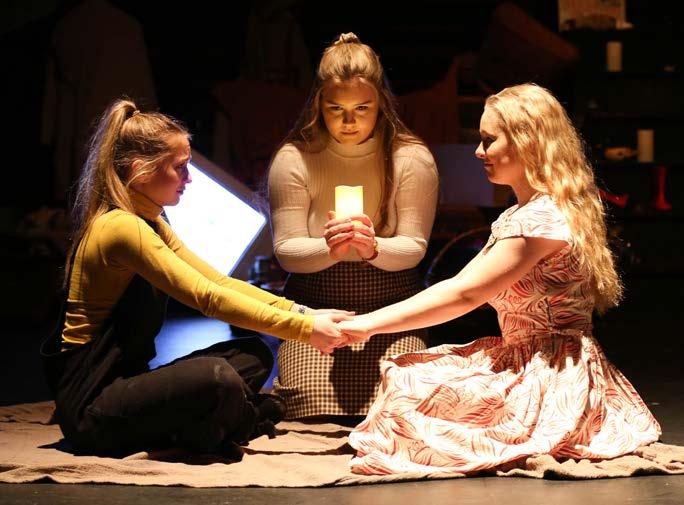
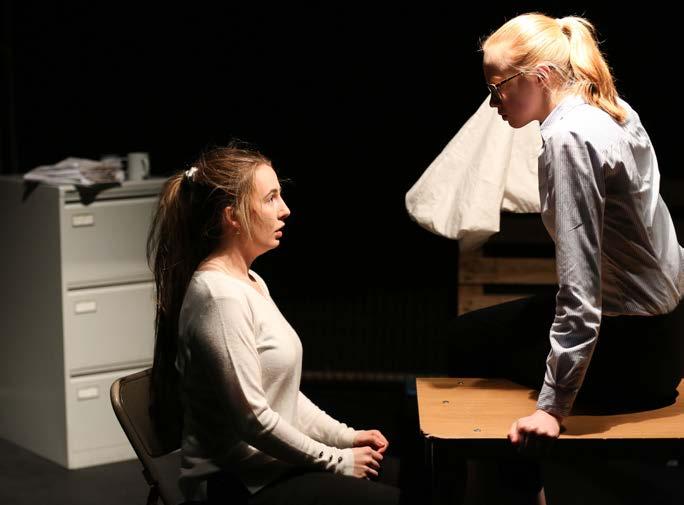
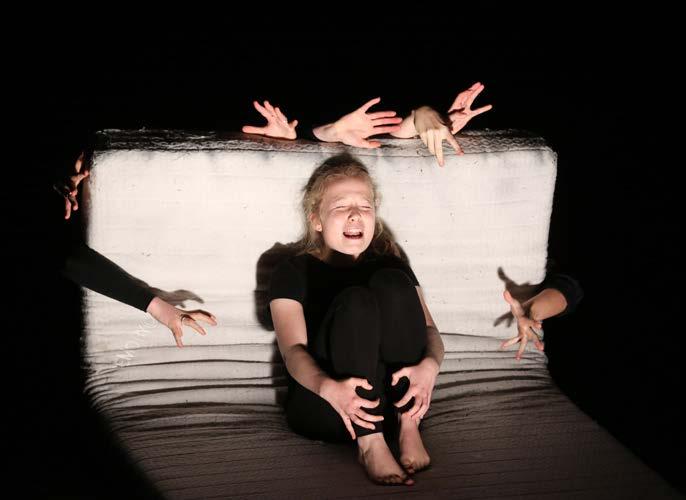
Similarly, Bryony Moffat, Oscar Russell and Parravano-Tomasso produced an outstanding exploration of mobile phone technology and the impact it has on society. The practical performance examination also produced visually and aurally arresting productions of Girls Like That, Adult Child/Dead Child, and Macbeth. Oscar Russell’s delivery of two of Shakespeare’s most famous monologues from Macbeth was breathtaking. With consummate grace he captured the inner turmoil of a man wracked by guilt. His work displayed a level of emotional maturity exceeding his years - remarkable work. Adult Child/Dead Child was brought to life brilliantly by Olivia Henson, Bryony Moffat, Alison Fry and Parravano-Tomasso. They examined the plight of a central protagonist suffering from mental health issues, manifested through the creation of an imaginary friend called Benji. The play retrospectively details the journey the protagonist takes through life, examining how the condition develops and worsens, resulting in parental, educational and institutional conflicts. This journey explores the consequences of mental illness on an individual by juxtaposing the story of the child against the alter-ego of the imaginary friend, Benji. The initial trigger could be defined as low-level psychological abuse, consisting of high-level parental expectation, enforced by punitive measures including being locked in a cupboard. In order to escape the cycle of failure, guilt, and punishment, the victim develops an imaginary friend as a scapegoat. This releases an inner voice which quickly gets out of control, blurring the line between reality and fantasy. The cast was interested in exploring the consequences of this worsening condition which resulted in physical restraint, high-level control and a desire to escape. As the condition worsens, the cry for help becomes dangerous and develops into physical aggression. The consequences of mental illness were communicated through the cast’s increased use of physical theatre, the more frequent appearances of Benji, and extreme contrasts in proxemics showing the child becoming more distant from the family and more influenced by the mental illness The piece attempted to communicate the degeneration of the child’s mental state and the growing influence of schizophrenia on the child. To do this effectively, all cast members played the Victim and Benji. Throughout the performance the cast employed different theatrical styles to help communicate their objectives; physical theatre was contrasted with moments of naturalism, choric function, synchronised action, and grotesque stereotypes. Sophie Huber, Maud Humphries, Martha Richmond, Sophie Smith and Saskia Steca performed a fantastic extract from Evan Placey's Girls Like That, which explores the pressures of social structures within female friendship groups following a controversial event. The group worked fantastically well as an ensemble and collaborated excellently. All the girls are highly capable performers and were able to use a number of different performance skills in a professional and high-calibre way. The multimedia performance was effective in portraying the voyeuristic themes in the play and the animalistic nature of the collapsing friendship group. Following an exceptional devised performance, this scripted
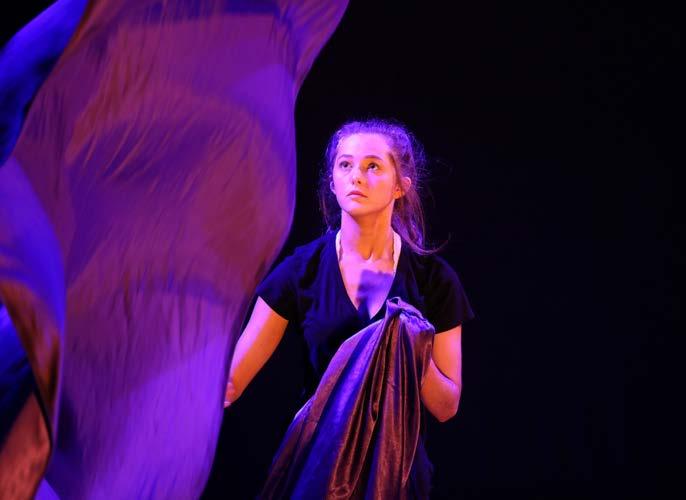
performance was an outstanding conclusion to the GCSE course for the group. The girls also performed monologues from the same play which focussed on the expectations of women throughout history, with distinctly pro-feminist themes. Maud Humphries portrayed the refined elegance of a 1920’s debutante as she turns her back on her controlling brother at a pool party. Sophie Huber showcased her fantastic comedy skills as the WW2 female pilot playing a prank on a condescending colleague. Sophie Smith brilliantly channelled her inner hippy, relishing the social change taking place during the 1960s. Martha was wonderfully sassy in her portrayal of a power-dressing intern in a maledominated yuppie world who stands up to her boss. Saskia was excellent in her performance of a teenage girl standing up to her classroom bullies, using her female ancestors as examples of female empowerment. The girls were completely professional in their approach to both the group performance and their monologues. The class continually impressed me with their talent, dedication and enthusiasm. Despite the pressures of the pandemic, this year provided a wide range of opportunities for pupils to engage in positive theatre experiences. Touring companies brought new work into the school, professionals from the world of theatre conducted workshops and a host of theatre visits was arranged. Venues as diverse as Shakespeare’s Globe Theatre in London and the Leeds Playhouse became familiar haunts to our pupils. There were many wonderful moments throughout the year, but space limits how much we can convey. Our thanks and appreciation go to all the pupils whose lives we have touched this year and to those of you who have supported us by attending performances. Finally, a big thank you to the Governors, the Senior Management Team and all the staff at Giggleswick School for supporting our efforts.
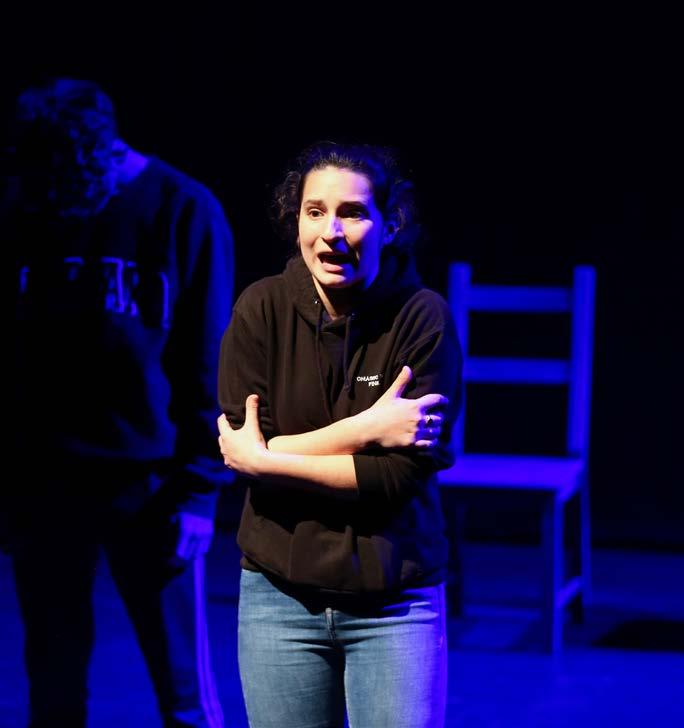
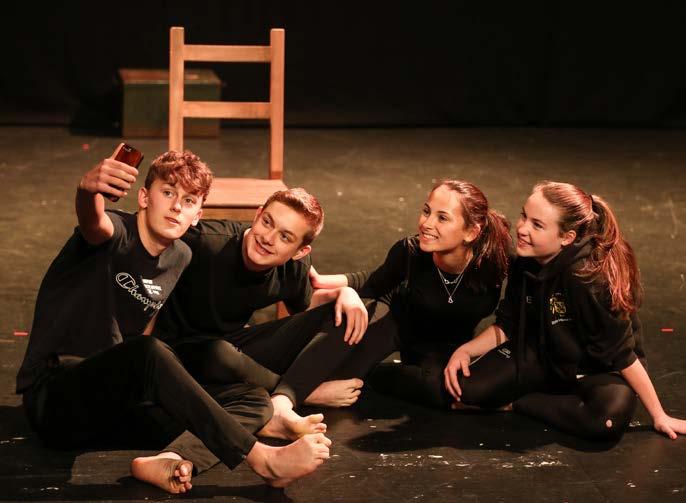
YOUNG MUSICIAN OF THE YEAR 2020
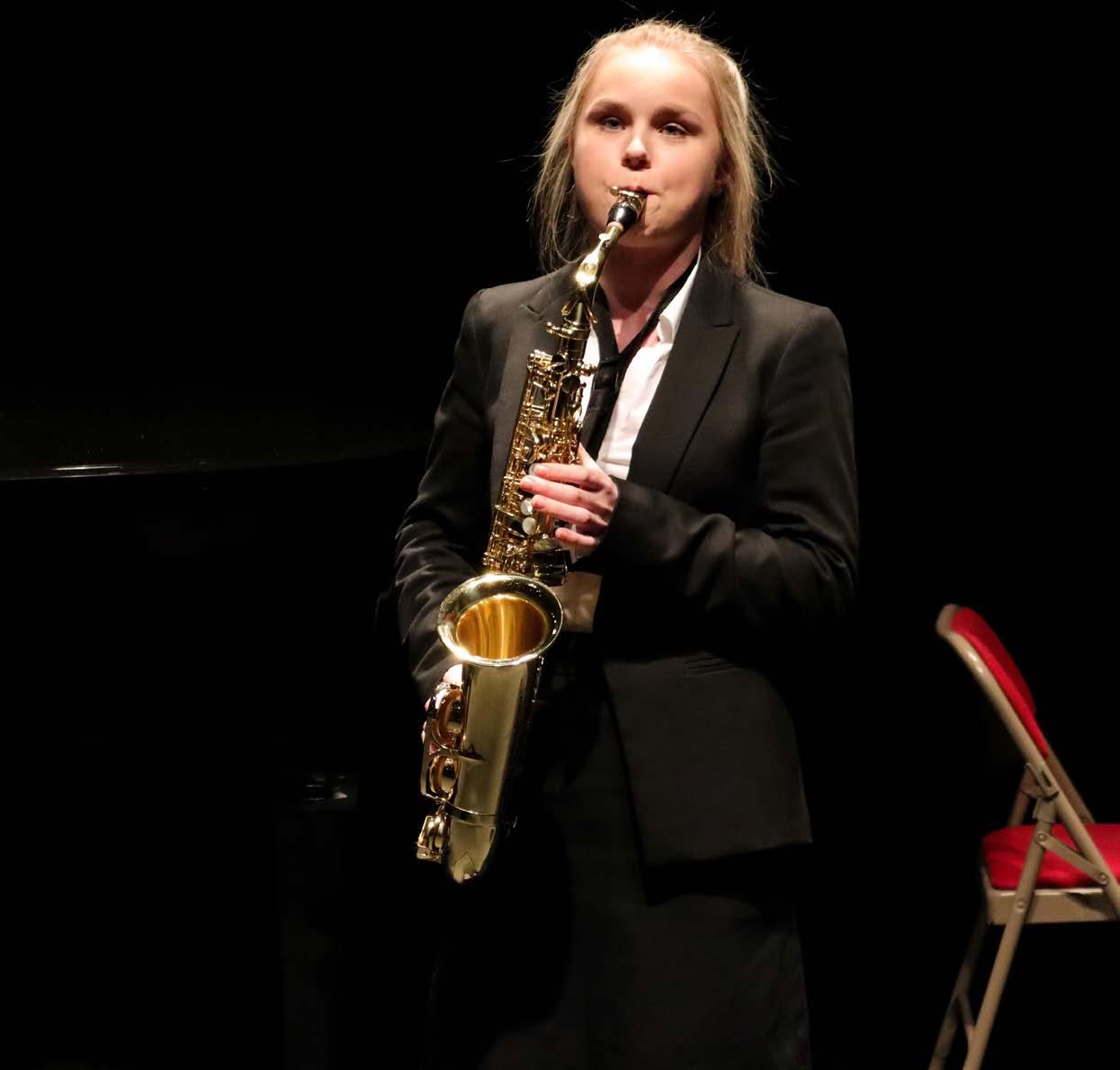
Another year of outstanding achievement!
Congratulations to saxophonist Maddison Goode, who was the overall winner of this year’s Young Musician of the Year competition. Martha Lloyd was awarded the Key Stage 3 title. A wealth of musical talent from across the age groups was on show at the event, which involved pupils at all levels competing in classes for piano, strings, woodwind, brass and singing. Our Young Musician of the Year contest is a fantastic opportunity for our students to perform in front of an audience, compete among their peers and receive detailed, personalised feedback from a professional musician. The competition demonstrates and showcases every one of our school values of participation, ambition and respect, and the much sought-after prizes are hard fought for among the richly talented musicians at school. Our pupils devote hours of time to rehearsals alongside their studies and other school commitments. This year we were very fortunate to have our former Director of Music, Tim Harvey, act as adjudicator. Tim spent
16 years as part of Giggleswick’s music department, acting as Musical Director for many musical productions, notably West Side Story (1994), Jesus Christ Superstar (1999) and the school’s first production of Les Misérables (2003). Since then he has been Director of Music at Liverpool College and at King’s School, Chester, and now is an examiner for ABRSM. Last year he was made a Fellow of the Royal College of Organists. Our overall winner, Maddison Goode, performed Scaramouche Suite on the alto saxophone and Martha Lloyd won a Singing Class, as well as being named Key Stage 3 Young Musician of the Year for her performance of I’ve got you under my skin. Tim Harvey commented: “It was a delight to be back at Giggleswick. The pupils’ presentation, introduction and communication with the audience were very impressive and of a professional standard. The standard was extremely high in all classes throughout the day. There has to be a winner but the classes were very tight, with very little between all the performers.”
